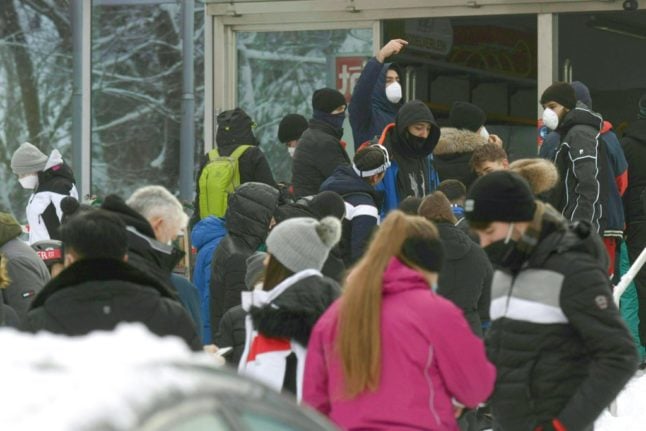Due to favourable snow conditions on Saturday and Sunday, big crowds came in droves to ski areas throughout the country, Swiss media reported.
For instance, in Flumserberg in canton St. Gallen, the crowds were so large that the fire brigade and police had to be called up, SRF public broadcaster reported.
“The distance rules were not observed for very long”.
In the Valais resort of Anzère, nearly 4,000 people came to ski on Saturday.
JA zur flächendeckenden Schliessung von Skigebieten in der Schweiz. Heute in der Ausgabe der “20 Minuten” bin ich erwähnt worden.https://t.co/HWcb0FR8r1
— Raphael Zimmerli – Die (Junge) Mitte Schweiz (@raffi931) January 17, 2021
The line of those waiting to get on the ski lift extended over 250 metres, and distances were difficult to respect.
“You understand that if we respected the metre fifty distance between each individual, the queue would reach Sion”, said Bertrand Dubuis, director of the Anzère ski lift.
Sion is the capital of Valais, located about 15 km from Anzère.
READ MORE: New Covid variant will become dominant in Switzerland 'by February
The situation was the same in the Vaud resort of Villars.
“We patrol the area but can’t be everywhere,” said Florence Maillard, a spokesperson for the Vaud cantonal police.
“You can’t put a police officer between each person in a queue”, she noted, adding that “it is also the responsibility of the skiers and the resorts to ensure that things run smoothly “.
However, Raphael Zimmerli from Junge Mitte political party tweeted that the Federal Council should close the ski areas altogether to prevent crowds swarming around ski lifts, and potentially spreading the virus. “The five-person rule must be consistently enforced at all levels”, he said.
Ich empfehle dem Bundesrat die Skigebiete schweizweit zu schliessen. Die verfügten Corona-Massnahmen (z.B. nicht mehr als fünf Personen bei einem Treffen) müssen konsequent auf allen Ebenen, auch bei Skigebieten, durchgesetzt werden.https://t.co/sKcRJ6C291
— Raphael Zimmerli – Die (Junge) Mitte Schweiz (@raffi931) January 16, 2021
So far, Switzerland has no plans to close the ski slopes, although authorities don’t rule out this step if the epidemiological situation requires it.
Switzerland is the only country in Europe to allow skiing amid the pandemic, but authorities said resorts must rigorously apply strict protection plans and capacity limits.
At the end of November, the Swiss Ski Lift Association created a set of rules that must be followed in all resorts open to skiers.
These measures include regulating queuing in such a way that it “runs in an orderly manner and without major clusters” — a rule that was broken in several ski resorts over the weekend.
Additionally, skiers must wear masks not only in closed spaces such as mountain trains and cable cars, but also on open-air chair lifts and T-bars, as well as in queues.
READ MORE: EXPLAINED: What are the Covid-19 rules for skiing in Switzerland this winter?



 Please whitelist us to continue reading.
Please whitelist us to continue reading.
Covid cases is decreasing in Switzerland so we should not worry too much.